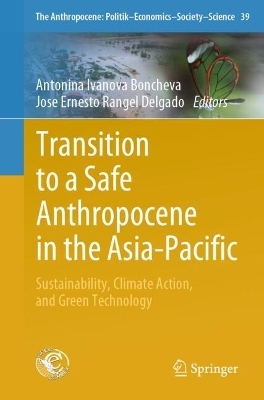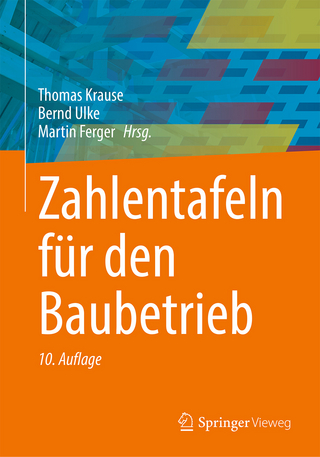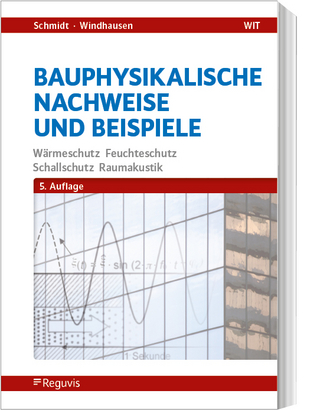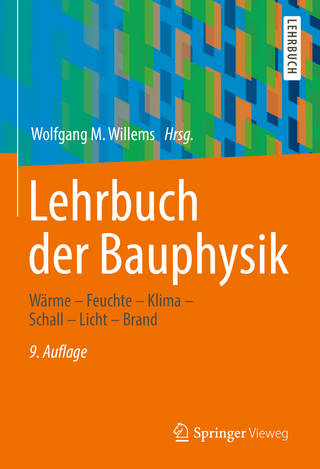
Transition to a Safe Anthropocene in the Asia-Pacific
Springer International Publishing (Verlag)
978-3-031-66520-2 (ISBN)
- Noch nicht erschienen - erscheint am 19.11.2024
- Versandkostenfrei innerhalb Deutschlands
- Auch auf Rechnung
- Verfügbarkeit in der Filiale vor Ort prüfen
- Artikel merken
The Anthropocene concept highlights that we are now living in a new epoch of earth history where both the rapid accumulation of greenhouse gases and excessive consumption of natural resources endanger human and planetary wellbeing. Climate change is one of the main drivers of the Anthropocene and is intricately linked to many great challenges we face: lack of fresh water, food security, biodiversity loss, and human rights of present and future generations. The radical influence of humanity on nature must change from destructive to reconstructive, by the path of sustainable development, circular economy, climate action, green technology, and environmental awareness.
This book explores the pathways of transition towards a safe and sustainable Anthropocene in the Asia-Pacific and reviews the progress and the challenges in climate action, the recovery from COVID-19, and the re-articulation of world order. The chapters address both regional and country levels, the majority analysing China and Mexico. The experiences presented can be replicated in other regions of the world.
The book offers useful insights for all interested in the Anthropocene, in climate action, sustainability, and the relationship between human beings and nature, thus motivating the decision-makers to implement a just and inclusive transition to a safe Anthropocene.
- A novel study that explores links between the Anthropocene, climate change, and sustainability, framing the transition towards a safe and sustainable Anthropocene in the Asia-Pacific.
- Strategies and policies on climate action, renewable energies, green technology, and environmental education include the participation of governments, NGOs, and civil society.
- Case studies based on experiences at the regional and country level provide valuable insights for both industrialised and developing countries.
Antonina Ivanova Boncheva is Professor and Senior Researcher at the Department of Economics and Director of APEC Studies Center, Universidad Autonoma de Baja California Sur, Mexico. Doctor in Economics (UNAM, cum laude) with Postdoctoral Degree in Peace Studies (University of Bradford, UK). She served as Vice Chair of Working Group 3 Bureau of the Intergovernmental Panel on Climate Change (IPCC), 2008-2016. Member of Mexican Academy of Sciences and Mexican System of National Researchers. Lead Author of the Fourth Assessment Report of the IPCC (Nobel Price Reward 2007), Review Editor of the Fifth Assessment Report and of the IPCC Special Report on Renewable Energies, and Lead Author of the IPCC Sixth Assessment Report (2018-2022).
Her research focuses on policies and instruments of climate action, international cooperation and sustainable development. Author or editor of 25 books, 82 book chapters, and more than 200 peer reviewed papers. Invited professor at the Universities of Bradford and Leeds, UK; University of California, San Diego and Northridge, CA, US; University of Tottori, Japan; Academy of Sciences of Bulgaria. Winner of the Science and Technology Award of the State of Baja California Sur, 2017 and Award as Researcher on Pacific Rim, 2021.
José Ernesto Rangel Delgado holds a PhD in Economy of Developing Countries: Asia, Africa, and Latin America from the Russian Academy of Sciences (1991) and is a full-time professor-researcher at the Universidad de Colima from 1994. He has been professor at Universidad Nacional Autónoma de México, at the Universidad Autónoma de Baja California Sur, Hankook University (South Korea), University of Texas A&M (USA) and Utsunomiya University (Japan). He is the author/co-author of 50 articles, 16 books, and 34 chapters of books. He was both Director of the Faculty of Economics (1996-2000) and Coordinator of the Transpacific Relations PhD (2000-2016) and is in charge of the Pacific Basin Studies Center from 2001 at the Universidad de Colima. Nowadays is Coordinator of the "Antonio Dueñas Pulido" Research Seminar on Russia (2017, still today). He was distinguished as Honorary Member of the Pacific Circle Consortium based in USA, and by the Universidad de Colima for his contributions on the Pacific Rim in Mexico. He has been distinguished as a fellow in the Korea Foundation 2010. He is a member of PRODEP-SEP and SNII-CONAHCYT programs. His line of research is on International and Economic Relations in the Pacific Rim.
1. Anthropocene, Climate Change, and Sustainability.- 2 . Is the Tonga Eruption (2022) A New Climate Change Threat for the Pacific Basin?.- 3. Asia-Pacific Economic Cooperation (APEC) Low Carbon Future: Policies for Sustainable, Inclusive and Just Transition.- 4. University 3.0: Entrepreneurship Education and Socio-Digital Skills (SDS) as Pillars of Sustainability in the Future Education for Asia-Pacific and the World.- 5. Exploring the Influence of Human Capital on Environmental Degradation in Asian-Pacific Countries. The role of renewable energy.- 6. Determinants of Technology Adoption for Renewable Energy in Southeast Asia. The Case of Solar Power in Australia and Japan.- 7. Conservation and Development of Forests Within the Countries Affiliated with the Transpacific Partnership Agreement in Southeast Asia and the Countries of the American Coast.- 8. Green Technology Innovation System as a Chinese Solution to Reduce Greenhouse Gas Emissions.- 9. China and the Climate Change Challenge of the 21st Century.- 10. Challenges for the Advancement of Clean Energy in China.- 11. An Approach to Chinese Global Governance: The Case of Non-Governmental Organizations.- 12. Beijing 2022 Olympic Winter Games, Sports Diplomacy or Climate Leadership?.- 13. Mexico facing truncated adaptation to extreme climate impacts by limited governance.- 14. The Efect of the Covid-19 Pandemic on the Development of the Mexican E-government Model.- 15. Democracy and Environmental Education: A Necessary Symbiosis in Mexico.- 16. The Green Customs Initiative (GCI) and the Multilateral Environmental Agreements (MEA's): An Analysis of the Perception about its Implementation and Compliance in Customs Manzanillo, Colima, Mexico.
| Erscheint lt. Verlag | 19.11.2024 |
|---|---|
| Reihe/Serie | The Anthropocene: Politik—Economics—Society—Science |
| Zusatzinfo | X, 310 p. 31 illus. in color. |
| Verlagsort | Cham |
| Sprache | englisch |
| Maße | 155 x 235 mm |
| Themenwelt | Technik ► Architektur |
| Schlagworte | Anthropocene • Asia Pacfic • climate change • Environmental education • just transition • Mitigation and adaptation • public policies • Recovery from COVID-19 • Sustainabilty transition |
| ISBN-10 | 3-031-66520-1 / 3031665201 |
| ISBN-13 | 978-3-031-66520-2 / 9783031665202 |
| Zustand | Neuware |
| Haben Sie eine Frage zum Produkt? |
aus dem Bereich


